Travel is one of the most popular industries worldwide, offering a multitude of benefits such as new experiences, cultural immersion, and relaxation. With such a high demand, competition within the travel industry has skyrocketed, making it difficult for brands to stand out. This is where link building for travel websites comes in as a powerful tool to boost a travel brand’s visibility and credibility.
Like with the Saas niche, backlinks are a crucial ranking factor for ranking a travel website. However, link building must be done strategically, focusing on quality over quantity and using relevant anchor texts to avoid penalties from search engines. In this way, link building can be a sustainable and effective method to drive traffic and build brand awareness in the competitive travel industry.
In the following guide, we’ll walk you through the most important aspects of link building for travel brands, from preliminary research and choosing the right tactics to measure results and ensure that your SEO efforts remain sustainable in the long run.
Why are Backlinks Important for the Travel Industry?
Link building can have several significant benefits for a travel website.
First, backlinks are a crucial ranking factor for search engines like Google. Websites with more high-quality backlinks tend to rank higher in search results, which can lead to increased organic traffic.
Additionally, backlinks can drive referral traffic from other websites, exposing the brand to new audiences.
Finally, link building can improve a website’s overall brand awareness and credibility, as backlinks from authoritative websites can signal to search engines that the website is a reliable source of information.
Enhancing your travel blog SEO will make your website stand out in the overcrowded marketplace and bring a torrent of new customers to your (virtual) doorstep, leading to a noticeable growth in revenue.
Here is a story of how we drove organic traffic to one of our clients in the travel niche by over 100%!
Our Tried and Tested Approach to Link Building for Travel Websites
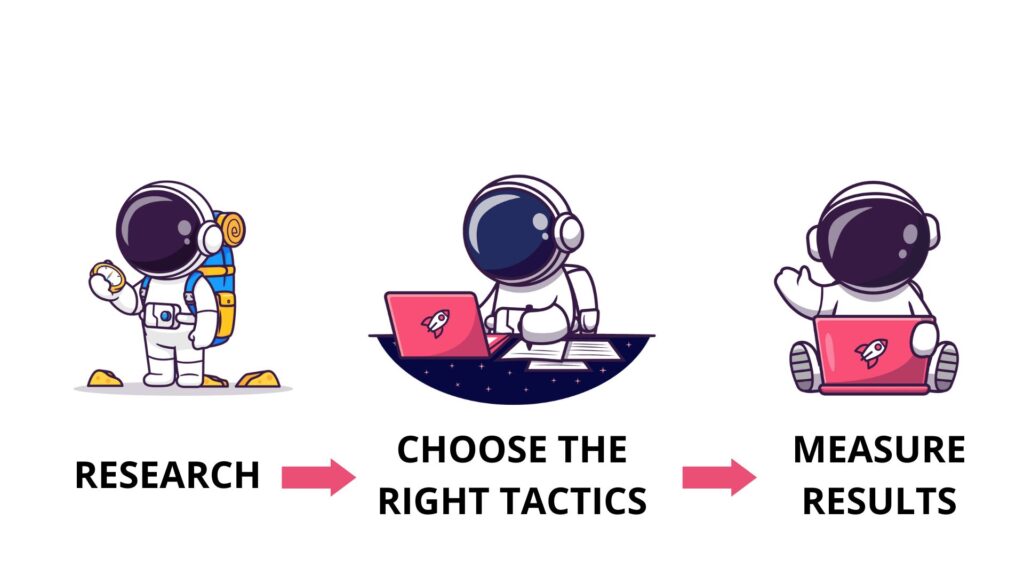
Link building is a critical component of SEO for travel bloggers. To create a sustainable and effective link building strategy for a travel website, you need to adopt a strategic approach that involves three key steps:
- Research phase: This phase consists of a thorough analysis of your content, your competitors’ backlink profiles, and your target audience to identify potential link building opportunities.
- Choosing the right link-building tactics: Once the research is complete, you need to select the right link-building tactics that will help you achieve your objectives.
- Measuring results: Finally, it’s important to measure the results of these link building efforts to ensure they are driving the desired outcomes, such as increased traffic and higher search engine rankings.
Step 1: Research Phase

To ensure the success of your link building for travel websites, you must have a firm grasp on some information regarding your business, your competitors, and your audience.
The following three steps form what we call the pillars of the research phase. They will lay the foundation for a successful link building campaign, allowing you to make informed decisions and prioritize efforts for maximum impact.
- Business Analysis
- Competitor Analysis
- Audience Analysis
Business Analysis
The first step of a link building campaign is having a thorough understanding of your business and objectives. The most important things to be mindful of are:
- Tone of voice: The tone of voice is the personality of your brand, and it can affect the types of websites and blogs that you target for link building. So, for example, if your business has a fun and adventurous tone of voice, you may want to target travel blogs that cater to adventure seekers or backpackers.
- SEO goals: Are you seeking to increase website traffic, improve search engine rankings, or establish your website as an authority in the niche? Accurately defining your objectives will help you figure out what to focus on, and could potentially save you a lot of time and effort.
- Performing a comprehensive content audit: Review all of the content on your website, including blog posts, landing pages, and other types of content. You will look at metrics such as traffic, engagement, and backlinks to identify the best-performing content and the areas that need improvement.
- Determining your budget: Right from the outset, determine how much time, resources, and money are you willing to invest in link building. This can help you prioritize your efforts and identify the most cost-effective strategies.
Competitor Analysis
Once you understand your strengths, weaknesses, and objectives, you need to understand who you are competing against in the overcrowded marketplace. Knowing your competitors and their link building practices can give you insights on where to start looking for opportunities to build links.
The most important aspects of this stage of research are:
- Content audit: Look at the type of content your competitors are creating and sharing. Identify popular topics and formats that you can replicate or improve upon for your website. Also, try to find areas where your website can offer something unique or better to attract more travel backlinks and more traffic.
- Keyword and anchor audit: Use a keyword research tool like Ahrefs or Google Keyword Planner to identify the top keywords your competitors are targeting. Analyze the anchor text used in the travel blog links to your competitors’ websites, as well as the anchor text for their internal links. This will give you valuable insights into the keywords and anchor text that are most effective in your niche.
- Backlink audit: Analyze the backlinks of your competitors to identify high-quality websites that you can target for link building. Look for websites that link to multiple competitors, as these are likely to be authoritative websites in the industry.
Audience Analysis
If you did your marketing homework, you should have a detailed description of your ideal customer. However, gaining deeper insight into the online behavior of your audience will allow you to develop a more targeted and effective link building strategy.
The most important things to look out for when performing audience analysis are:
- Their favorite blog-post format
- What features of blog posts trigger them to share and engage with the content
- What is their preferred tone of voice
- What are their favorite media networks
- What keywords do they use when searching for travel-related content
- Which brands and influencers they follow and why
Step 2: 5 Most Effective Link Building Tactics for Travel Websites
With our 6 years of experience in link building for the travel niche, we have identified the most effective tactics to boost your website’s ranking and drive traffic. What follows are the top five link building strategies that have consistently yielded positive results in our campaigns.
#1: Guest Posting
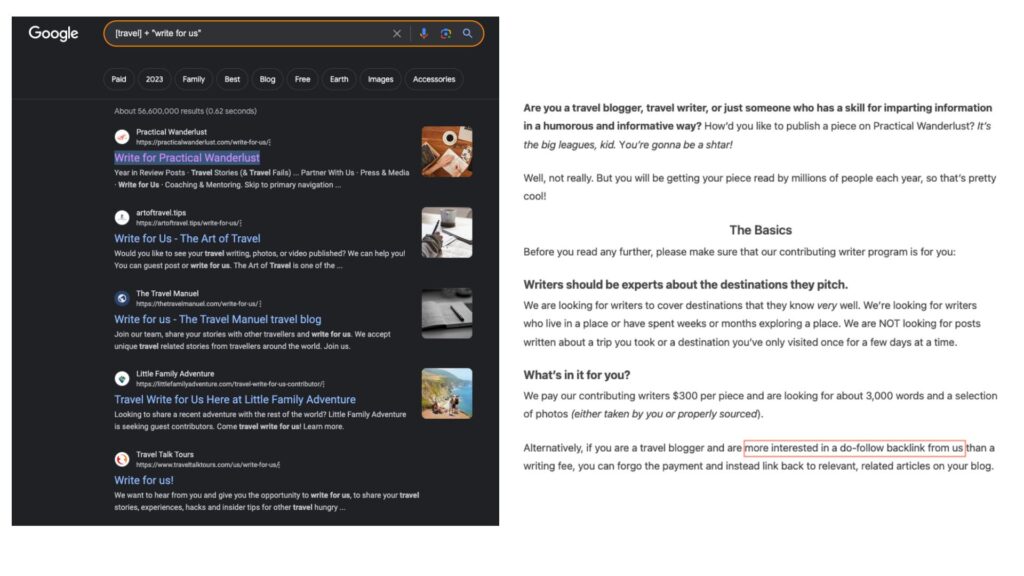
An evergreen tactic used across the board, guest posting has been the staple of successful link building campaigns since the early days of SEO. Even today, its importance hasn’t faded the slightest bit.
By publishing a guest post on a website in a relevant industry or niche, the author can include links back to their own website, which can help improve their website’s domain authority, search engine rankings, and overall online visibility. By identifying relevant websites in your niche and creating high-quality content for their audience, you can earn quality backlinks and establish your brand as an authority in the travel industry.
To do guest posting right, make sure to follow these steps:
- Find relevant opportunities with search operators: Use search operators to find relevant websites or blogs that accept guest posts. For example, you can use the following search operators in Google to find guest posting opportunities: [travel] + “write for us,” [travel] + “guest post,” or [travel] + “submit a guest post.”
- Find relevant keywords to target: Use keyword research tools to find relevant keywords to target in your guest post. This can help ensure your post is optimized for search engines and attracts the right audience.
- Craft an epic outreach sequence: Create a personalized guest post outreach sequence that includes a compelling subject line, an engaging introduction, and a clear value proposition. Follow up with each prospect multiple times to increase your chances of success. Here are some awesome tips on how to write a high-converting outreach email!
- Write a high-quality guest post: Once your outreach efforts are successful, write a high-quality guest post that provides value to the target website’s audience. Be sure to include a bio and link back to your customer’s website in the author bio section.
Travel bloggers are generally known to be a friendly bunch, and you shouldnt hesitate to contact them and offer to do a guest post. When planing your guest posting outreach, keep in mind the following about travel bloggers:
- It’s not hard to reach out to them: Travel bloggers are often active on social media and have their contact information readily available on their website. It’s easy to reach out to them with a personalized message or email.
- Most of them understand how SEO works: Travel bloggers often have a good understanding of SEO and how it can benefit both their website and the websites they collaborate with. This can be helpful when negotiating the terms of a collaboration.
- They are great at negotiating: Travel bloggers are often skilled negotiators and understand the value of their platform and audience. They may be open to different types of collaborations or partnerships, so be prepared to negotiate the terms of the collaboration.
- They are more than open to collaborating multiple times: Travel bloggers often build ongoing relationships with the brands they work with, and they are open to collaborating multiple times. This can be beneficial for building long-term relationships and creating a consistent stream of content for your website.
#2: 3-Way Link Exchanges

3-way link exchanges, also known as ABC link exchanges, involve website A linking to website B in exchange for a link from website C.
Say, for example, you own two websites (B and C), and would like another blogger (who owns website A) to provide you a backlink. In a 3-way link exchange scheme, website A would link to website B, while website C would provide a link back to website A.
Three-way link exchanges are often considered more beneficial for SEO purposes than two-way link exchanges because they form a more natural linking pattern. Two-way link exchanges between two websites can appear as a black hat tactic to search engines, as they suggest a reciprocal agreement rather than a genuine endorsement or recommendation. By involving a third website, three-way link exchanges create a more organic linking pattern that search engines are more likely to view as legitimate.
To find opportunities for three-way link exchanges, you can use a similar approach to finding opportunities for guest posting. Look for travel websites that may be interested in collaborating, and reach out to them with a personalized message explaining the potential benefits of a three-way link exchange. Be sure to keep the email brief and to the point, as bloggers rarely have time to read excessively long emails.
#3: Creating “Link-Bait” Posts
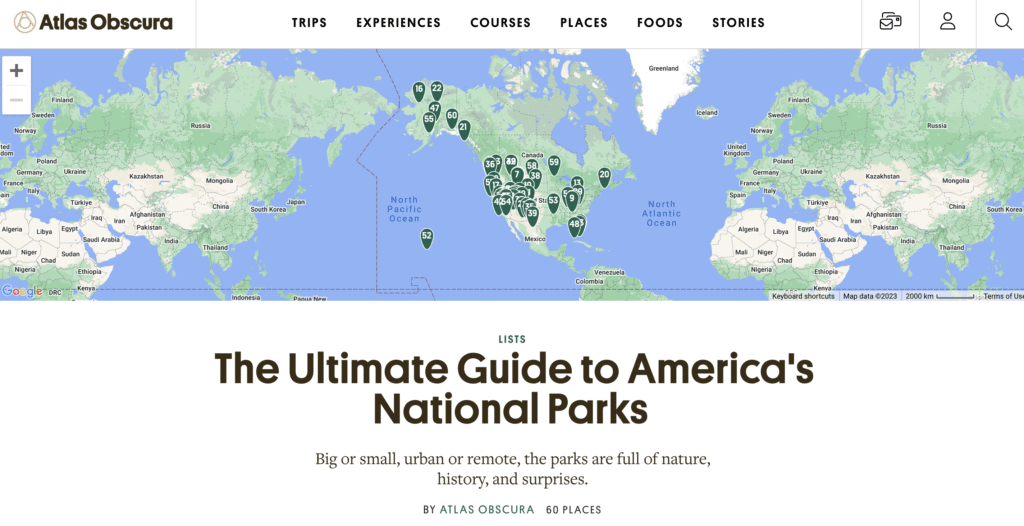
A “link-bait” post is a type of content that is specifically designed to attract links from other websites. These types of posts can acquire links naturally by offering valuable and informative content that other websites want to share with their own audiences.
In the travel industry, link-bait posts can take a variety of formats, but they generally have a few things in common:
- They offer valuable and informative content that is unique or hard to find elsewhere.
- They are visually appealing, with high-quality images and engaging design elements.
- They are often interactive or shareable, allowing readers to engage with the content in a meaningful way.
Here are some ideas for link-bait posts that are popular in the travel industry:
- “Ultimate Guides” to popular destinations or activities, with comprehensive information and insider tips.
- Lists of “hidden gem” destinations or off-the-beaten-path experiences that are not well-known to most travelers.
- Interactive maps or infographics that showcase interesting data or statistics related to travel.
- Round-ups of the best travel-related products, services, or apps.
- Photo essays or travelogues that document unique or interesting experiences.
To increase the likelihood of natural link acquisition, it’s important to promote your link-bait posts through social media and other channels, and to reach out to bloggers and other websites in the travel industry to share your content with their own followers.
#4: Facebook Groups Collaborations
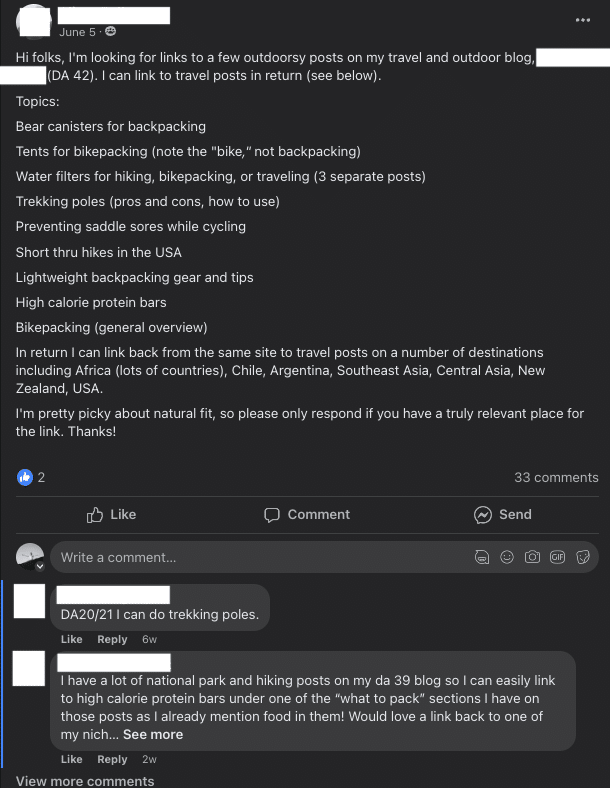
A collaboration post in a Facebook group is an excellent way to get exposure for your brand or website, and to connect with other members of the community. In these types of posts multiple members of the group come together to share their knowledge, resources, or expertise on a particular topic.
There are a number of ways collaboration posts benefit your overall travel blog SEO efforts, including:
- Increased exposure to a new audience
- Building authority by sharing your expertise
- Acquiring backlinks
Here are some actionable steps you can follow to get featured in a collaboration post:
- Find relevant Facebook groups in the travel industry. Look for groups with active engagement and a large membership base.
- Participate in the group by sharing valuable content, asking and answering questions, and engaging with other members.
- Look for opportunities to collaborate with other members on a particular topic or project. This could involve contributing your expertise to a group post, or partnering with other members to create a joint piece of content (such as a blog post or video).
- Reach out to the group admin or moderators to pitch your idea for a collaboration post. Be sure to explain why your contribution would be valuable to the group, and what benefits you can offer in exchange.
- Be sure to share your collaboration post with your own network and promote it through social media and other channels. This will help to drive traffic back to your website and increase your visibility within the group.
Since we already did the work in step 1 for you, here are a few notable Facebook groups for travel bloggers:
- Travel Bloggers Club
- SEO for Travel Bloggers
- Ultimate Travel Group (UTG)
- Women Travel Bloggers
- Travel Creator Community
- Wildly Successful Travelpreneurs
- Travel Bloggers Only
#5: Leveraging Social Media
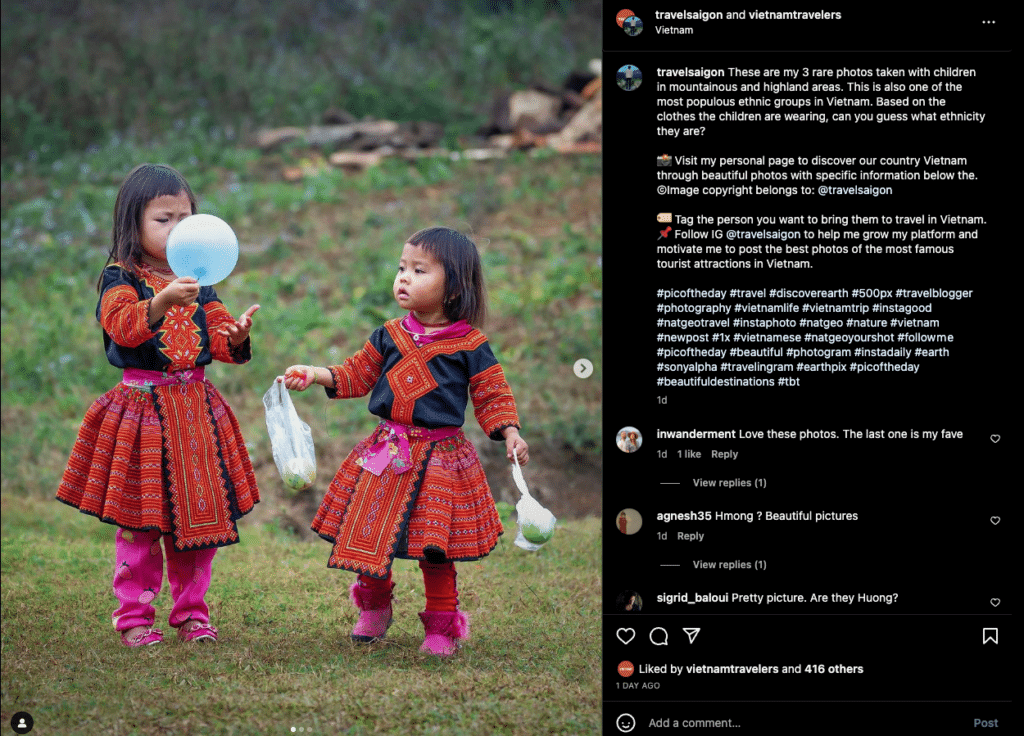
Social media platforms are a great way to promote your content and find travel influencers who may be interested in collaborating with your brand or website.
Although social media links are normally no-follow and may not carry as much weight as other types of backlinks, they can still impact your site’s organic search ranking. Social signals, such as the number of shares, likes, and comments on your content, indicate to search engines how popular and relevant your content is.
Since most, if not all travel bloggers are leveraging the power of social media, these platforms are the place to find collaboration opportunities. Here are a few ways you can look for them:
- Hashtags: Hashtags are a powerful tool for finding influencers who are talking about topics related to the travel industry. For example, you could search for hashtags like #travelblogger, #travelgram, or #wanderlust to find influencers who are sharing content related to travel.
- Keywords: Use social media search functions to find influencers who are using relevant keywords. For example, you could search for phrases like “travel tips” or “best places to visit” to find influencers who are sharing content on these topics.
- Popular accounts: Check out popular accounts in the travel industry to see if they are working with influencers. Many brands and websites partner with influencers to promote their products or services, so you may be able to find influencers by looking at who is being featured on these accounts.
- Influencer discovery tools: There are many tools available online that can help you find relevant influencers based on specific criteria. For example, you could use a tool like BuzzSumo or Klear to find influencers based on their location, interests, or engagement metrics.
When reaching out to influencers on social media, be sure to personalize your message and explain why you think they would be a good fit for your brand. Be respectful of their time and don’t be afraid to negotiate terms that work for both parties. Remember, collaboration should be a win-win for everyone involved.
Step 3: Measuring Results
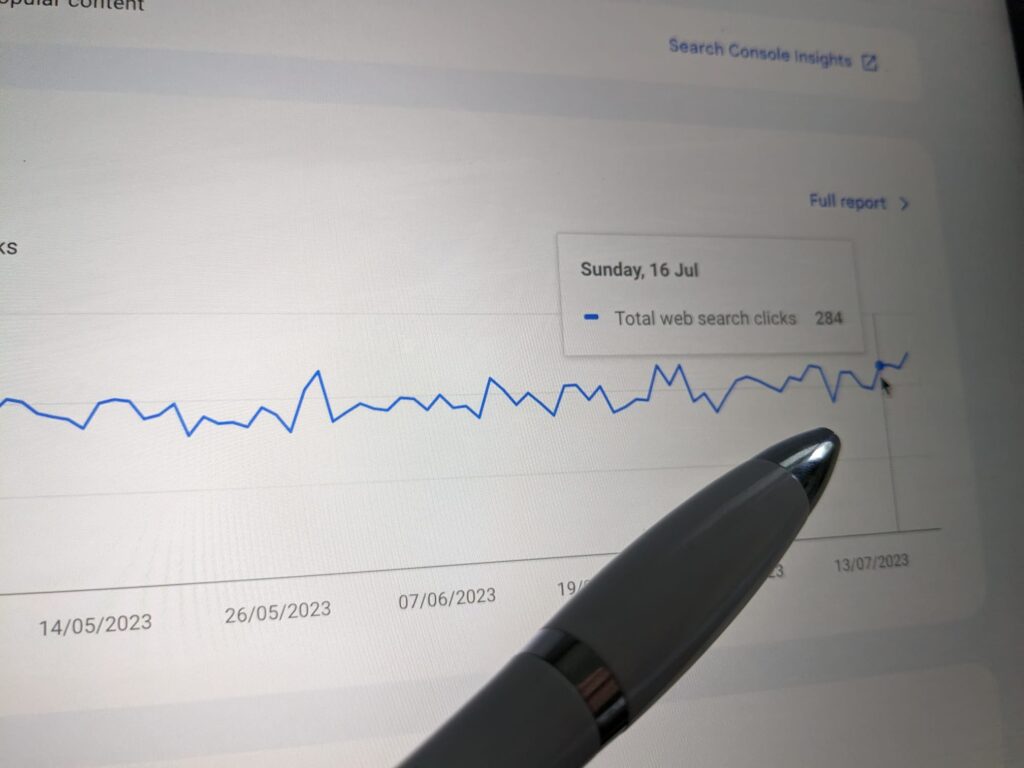
Quantifying the results of link building for travel websites is the only way to reliably determine if all the invested time, effort, and money are making a difference in terms of SEO performance.
Apart from the number of backlinks, there are a plethora of possible Key Performance Indicators (KPIs) for link building. The most important ones will, naturally, depend on your goals. However, based on our own experiences working with clients in the travel industry, here are a few KPIs that are definitely worth keeping an eye on:
- Domain Authority (DA): DA is a metric developed by Moz that predicts how well a website will rank on search engine result pages. Having links from high-DA websites can boost a site’s authority and search engine ranking.
- Organic and Referral Traffic: Link building efforts can drive traffic to a site through referral traffic from the websites that link to its content, as well as through higher rankings in SERPs. Therefore, it’s important to monitor a website’s traffic and analyze the sources to see if your link building efforts are achieving results. You can use tools like Google Analytics to identify which pages or posts are generating the most traffic, and where most referral traffic is coming from.
- Conversion rate: Measuring the number of conversions (such as bookings, sign-ups, or purchases) that result from referral traffic can help you determine the effectiveness of your link building efforts in terms of generating revenue.
- Link velocity: This is the rate at which new backlinks are acquired over time. Consistent link acquisition over time is a sure indicator your link building efforts are working.
- Engagement: The number of social shares, likes, comments, and other engagement metrics can signal to search engines that your content is high-quality and valuable to readers. This can improve your website’s authority and search engine ranking.
- Brand mentions: Tracking the number of times your brand or website is mentioned on external sites (even if not linked) can help you identify potential link building opportunities and quantify brand awareness.
Additional Tips on Making Your Travel Industry Link Building Efforts Sustainable

A one-off link building campaign followed by a long period of neglect could potentially bring you more harm than good in the long run. It is important to remember that link building for travel websites is an ongoing process that should continually be evaluated, while your strategies should be adjusted in response to your select KPIs.
Therefore, to make your link building efforts sustainable and effective in the long term, make sure to follow this general advice:
- Focus on quality over quantity: It’s better to have a few high-quality links than many low-quality ones. Aim to get links from authoritative websites in the travel niche that have a good reputation and high domain authority.
- Use relevant anchor texts: Anchor text is the visible text that appears as a hyperlink. Avoid using generic or unrelated anchor texts, as they can be seen as spammy by search engines.
- Prioritize link diversity: Getting links from a variety of sources is important to ensure a natural and diverse backlink profile. Aim to get links from different types of websites such as travel blogs, news sites, directories, and forums.
- Monitor and remove bad links: It’s important to regularly monitor your backlink profile to identify any bad links that could be harming your website’s ranking. Bad links include those from low-quality or spammy websites, as well as those with irrelevant or over-optimized anchor text. Remove them to avoid penalties from search engines.
Level Up Your Travel Website SEO!
Link building for travel websites is a crucial aspect of SEO that requires careful planning and execution. Firstly, it is important to conduct thorough research on your client, their competitors, as well as their audience and potential link opportunities. Some effective tactics for link building include guest posting, link exchanges, and leveraging the power of social media. Collaboration with travel bloggers and influencers is another sure way to boost your link building efforts.
Make sure to carefully monitor your KPIs, and always prioritize quality links over a greater number of bad ones.
Overall, effective outreach is crucial to successful link building in the travel industry. By focusing on building relationships, providing value to potential partners, and following up consistently, link building efforts can result in valuable backlinks that contribute to organic search ranking and drive traffic to your website.
If you are a travel website owner looking to improve your SEO, feel free to contact us. Our team of experienced professionals can provide comprehensive link building strategies tailored to your specific needs and goals.
